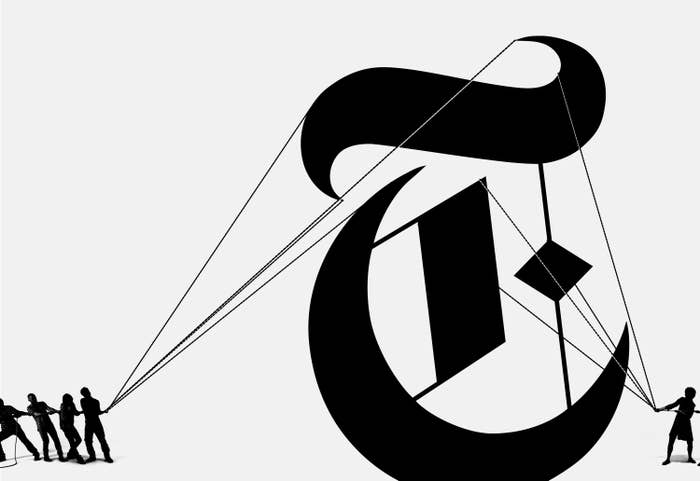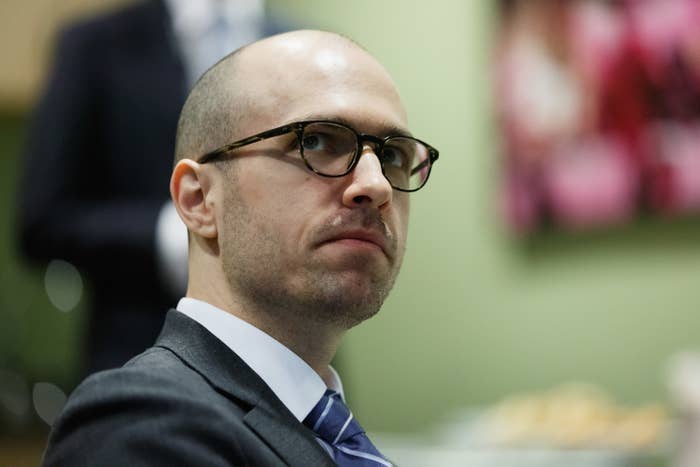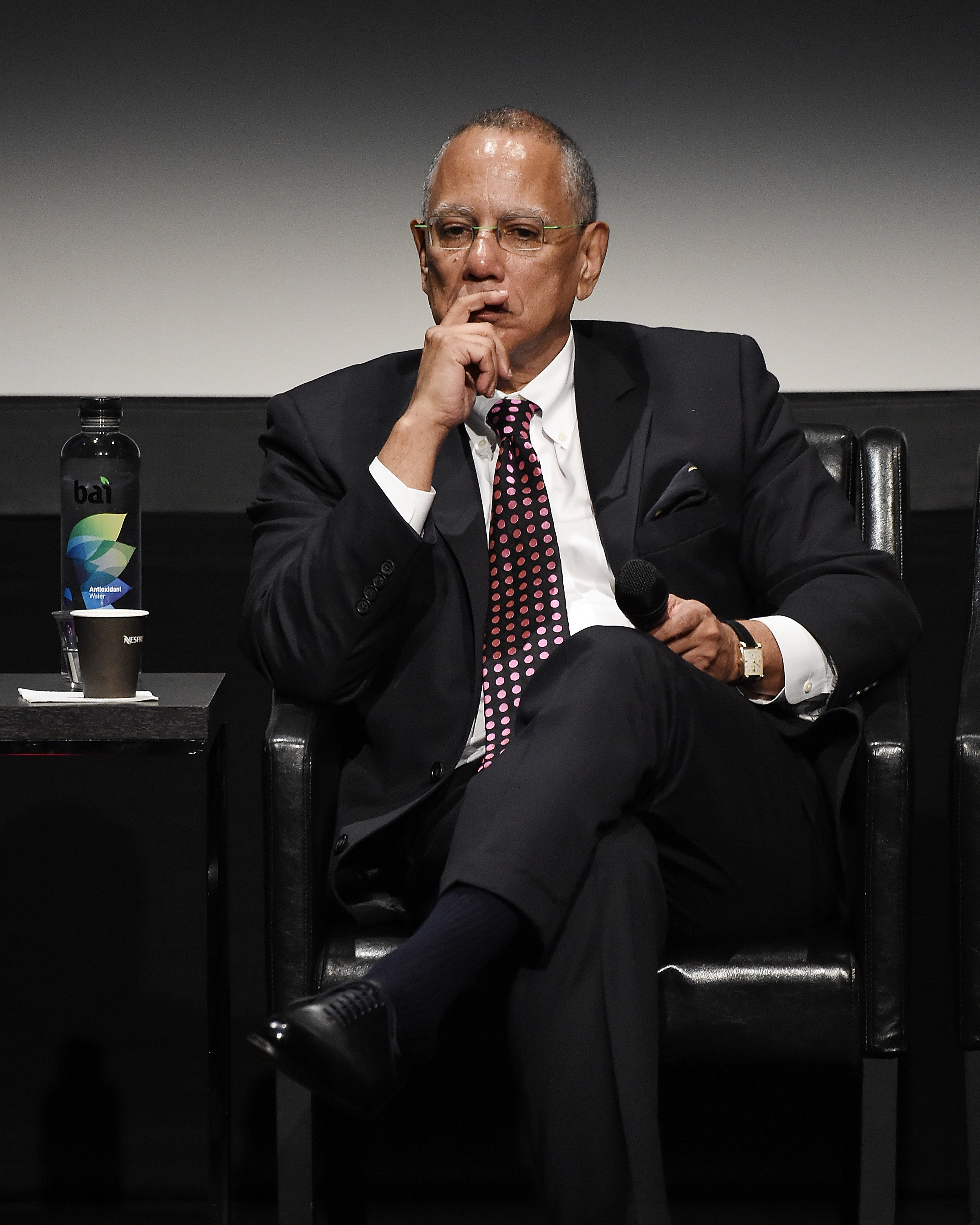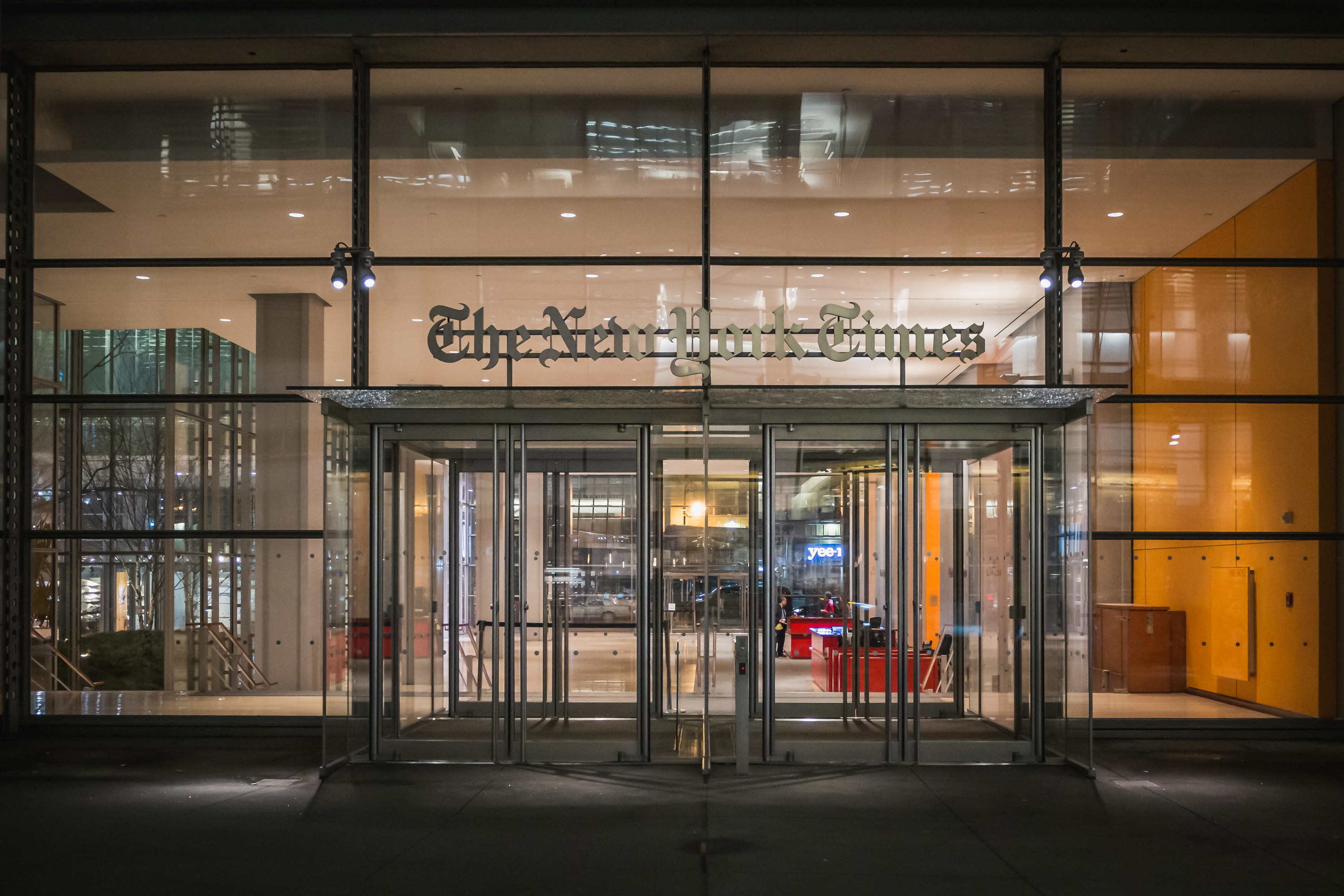
If you’re following the news these days, you’ll notice that a high percentage is about the New York Times — the headlines, the opinions, the tweets, the deeper question of what it is to cover the news straight in a twisted time.
But it’s also striking how little is understood, off 8th Avenue, about the source of the Times’ occasional meshugas.
Critics tend to imagine heated debates along the lines of ”How can we stop Donald Trump?” or “How can we make sure we hear from both sides?” In truth, the issue that dominates newsroom chatter these days is the beginning of an old-fashioned internal succession contest, featuring big personalities and decisions about the future of the most important news organization in the world. Indeed, some of what sometimes seems like Times’ defiance of its audience — its pride in the work of Bret Stephens, or its caution in calling Trump “racist” — is as much about the tensions over what the paper will become as it is about any explicit stance today.
Those questions about the future are playing out in the beginnings of an intense but decorous (that is, Timesian) campaign to replace Executive Editor Dean Baquet, whose retirement, per Times tradition, is due before his 66th birthday, in September 2022. Baquet laid out some of the pressures in a recent interview with the Guardian: Young staffers who “want a more political New York Times than I’m willing to give them” and empowered subscribers who are paying for the paper to “take a full-bodied side” against Donald Trump — and whose interest might depend on that.
The decision whether to accommodate those pressures, or to resist them, is ultimately up to the publisher, A.G. Sulzberger. And the campaign for the top job is expressed, right now, primarily by the three leading candidates leading their sections in slightly different directions.

“A lot of what you’re seeing right now is people are trying out and trying to impress the boss,” one top Times person told me.
I’m probably a bit of an odd person to be writing this piece, as the editor of a rival newsroom who is often jealous of the attention the Times gets for every punctuation mark. I know, in varying degrees, the candidates, and admire them all; I sympathize more than most with their various episodes of lighting themselves on fire. But the Times is also, now, a kind of Vatican of American journalism, and its direction will affect everyone else — so the internal choice is, sort of like the Democratic primary, of interest even to independents.
At the root of the question are a few paths: Can the Times hold its tenuous footing on the old neutrality of newspaper journalism, and fall back on it whenever Donald Trump’s departure restores the old normal? Can it find an updated version of that same set of values, digitally aware and, in particular, race-conscious kind of voice and reporting style? Or should it become something more fully new — whether the Resistance Daily, or a self-confident blend of advocacy and investigations, or a more ambitiously analytical paper built around pieces like Nikole Hannah-Jones’ 1619 Project? These questions are linked to, but not really identical to, the mostly resolved questions of whether the Times should become an internet thing (yes), whether editors should care about traffic (yes), and whether the younger Times staffers one more generation down will eventually take over (of course).
And while the Times will choose over the next couple of years among a few possible directions, people inside and outside the organization make clear that one aspect is already settled. Sulzberger is not considering the course that many of its readers, in this moment, seem to want: full-throated Trump resistance, and a more self-consciously political paper.
Sulzberger was the only Times employee I reached who was willing to speak on the record for this story. In an email, he praised Baquet as “the best editor in journalism” and celebrated the “digital evolution,” the strength and growth of the business, and the fact that Baquet has “tripled down on the top shelf important, mission-driven investigative reporting that has defined his career (from the #MeToo movement to Trump’s taxes to this weekend’s bombshell on China)."
“I hope and fully expect he will stay in his role as long as possible, which means any succession decision remains a long way off,” he wrote. “So although I know people love to speculate about this stuff, calling it premature would be a serious understatement.”

Baquet, the most successful modern editor of the Times, has told colleagues that his goal at the moment is to make sure Sulzberger can choose among a slate of strong candidates — and won’t find himself jammed up by a crisis, or delivered a fait accompli by internal maneuverings, as publishers often have been in the past.
Speculation is premature only in the sense that it was a bit early in, say, the fall of 2018 to be thinking about presidential politics. The Times is like the US Senate, in that at any moment there are no shortage of senior editors with their eyes on the prize. If you talk to people inside the building, the three main candidates (Joe Biden, Bernie Sanders, and Elizabeth Warren, as it were) are three white men in their early- to mid-fifties who run major chunks of the publication: Joe Kahn, James Bennet, and Cliff Levy. They are classic Timesmen of their generation: East Coast–bred (Boston, Washington, New York), Ivy League–educated (Harvard, Yale, Princeton), star reporters and bureau chiefs (Beijing, Jerusalem, Moscow), whose ambition nobody doubts.
The homogeneity of the frontrunners for the job is a bit surprising, given the paper’s recent editors and its moves toward diversity in the lower newsroom. It also comes after a few senior women who had at one point been seen as in the running left for other jobs. But the three represent different visions for the paper, and Sulzberger’s choice won’t simply be about personality or management chops.
One path is clear in Bennet’s wing of the paper, called Opinion, but now also the home of a kind of shadow newsroom. Bennet had left the Times to run the Atlantic; he’s a well-liked manager, and his return seemed to make him heir apparent. He brought in a wave of new voices, some to the left of the paper’s liberal tradition, and some to the right. He put more reporting on the editorial page proper, and snapped up a handful of reporters like my old colleague Charlie Warzel, who you’d expect to be working for the news pages, and whose “opinion” work you might struggle to differentiate from what the Times calls “news analysis.”
But Bennet has gotten the most attention for standing up to the left — that is, to the Times’ own readers, and to its critics on Twitter — by amping up the op-ed page’s tradition of provocation, often from the right, and publishing columns that have raised questions about the urgency of fighting climate change or the urgency of the Palestinian cause. Those moves have led to Twitter outrage, canceled subscriptions, and, perhaps most important, real anger in the newsroom at what they see as provocation for its own sake in a serious moment.
“A.G. sees the pageviews and the attempt to be more centrist and he likes that,” one person who occasionally talks to the publisher told me.
Bennet is the only leading candidate whose work responds to the core argument of many Times critics: that the old divide between objective reporting and having opinions was always — or at least, is now — absurd, and that you’d do better with a voice and a transparent point of view than a doomed attempt to hold the dissolving center. The only problem: Bennet doesn’t particularly see that as a path to a more explicitly progressive Times. He’s more likely to be the only one in the room with an ear for the conservative critics, whom most at the Times have now written off as acting in bad faith. He seems to be, like his presidential candidate brother, an old-fashioned moderate.
You can find a second vision of the paper in Levy’s Metro section. Levy returned from Russia to lead its digital efforts — you need, my boss once noted, two Pulitzer Prizes to be permitted to launch an app at the Times — and now that he runs a section of the daily report, has brought in some of the frankness of digital media, which you can see in particular in stories about race. There’s none of the old wooden Timesian language in a headline like “Why White Parents Were at the Front of the Line for the School Tour.” He recruited strong deputies from the Gawker Media universe and the Marshall Project, and his smaller Metro is voicier, winkingly self-aware and at the same time more aggressively investigative than it has ever been, making up for what the paper lost years ago as a voice of the city in being a big voice of the New York internet.
Kahn is managing editor (at the Times, that’s the vice president) and so his stamp is necessarily a little less clear. He would be, in some sense, the candidate of continuity with Baquet — a huge plus as the paper prospers — though he brings his own set of strengths. He’s deeply connected to the most important international story of the coming decades, China, where he won a Pulitzer in 2006 for reporting on its flawed legal system. He’s also seen internally as particularly engaged with the paper’s booming business side, a new requirement for a top editor these days. He is, like Baquet, calm and low-key in a high-stress job. And as a journalist, he represents the strength of the newsroom’s traditions, and the rejection of the Bennet moves that have driven the newsroom crazy.

Those three men are widely viewed internally as Baquet’s likely successors, and they represent three distinct paths, but they’re not the only possible candidates in an election that has, after all, only one voter. They have the particular qualifications, though, of running large chunks of the paper right now after a lifetime at the Times — the only real path historically.
Among the other names that come up include Carolyn Ryan, who ran the paper’s political coverage in 2016 and oversaw the Times’s debate this year, and is seen by some as in the mix for the top job or another senior role. The moderator of that debate, Marc Lacey, is a former correspondent and the current national editor, and a well-regarded internal figure. Rebecca Blumenstein, who has spent a mere couple of years at the Times after a career at the Wall Street Journal, revamped the business pages and is now running a sped-up breaking news operation.
If the Times is really looking to square its investigative momentum with this era of movement politics, it might also consider Jodi Kantor, a former section editor who has occasionally infuriated her peers by stepping onto someone else’s beat (Amazon, Starbucks, and finally Hollywood) and to write the most important story of the decade. Kantor and her partner Megan Twohey’s reporting, whether Kantor’s in the mix or not, seems to offer the Times a path through the tensions between its traditional neutrality and its capacity to launch a social movement.
“Our Weinstein reporting took place at a time of accusations of ‘fake news,’ as the very notion of a national consensus on truth seemed to be fracturing,’” she and Twohey write in the introduction to their book She Said. “But the impact of the Weinstein revelations was so great in part because we and other journalists were able to establish a clear and overwhelming body of evidence of wrongdoing.”
And what about the Times that Sulzberger and Baquet hear so much about from critics on Twitter, from grumbling subscribers, and from much of the young generation of their own newsroom? The one that stops trying to be perceived as fair by Trumpian critics whose beef is with journalism itself, and shakes off the old obsession with political neutrality?
Sorry. The phrase I heard to dismiss that again and again: “It’s just not in our DNA.”
